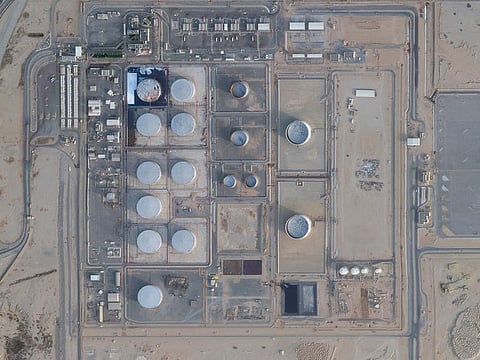Al Houthi attacks on Saudi Arabia threaten global economy
Iran’s regional policies must be part of the talks to revive the nuclear deal

While key oil-producing countries look for ways to stabilise the energy market, the latest Al Houthi attacks on Saudi Arabia’s Aramco’s facilities on the weekend deals a blow to global oil supply.
On Saturday and Sunday, the Iran-backed Al Houthi militia fired a barrage of missiles and drones, targeting a Saudi petroleum products distribution terminal in the southern Jizan region, a water desalination plant in Al Shaqeeq, a power station in Dhahran Al Janub, a gas station in Khamis Mushayt and an LNG facility in the Red Sea port of Yanbu, according to a Saudi official statement.
A Saudi foreign ministry official added that such attacks result in serious consequences for upstream and downstream sectors, affecting “the Kingdom’s production capacity and its ability to fulfil its obligations.” The official called on the international community to “realise the gravity of Iran’s continued behaviour in equipping” Al Houthis. Aramco CEO Amin Nasser noted that the terrorist attack was taking place “during a time when the market is very tight is a real concern for the world.”
The UAE in a statement condemned the attacks, which reflect Al Houthis’ “blatant disregard for the international community, the efforts made to end the Yemeni crisis, and all international laws and norms.” The statement urged the international community to take an immediate and decisive stance to stop these recurrent acts that threaten the security and safety of civilians as well as the security of global energy supplies and economic stability.
Serious push by the key parties
There has been a serious push by the key parties recently to bring about an end to the Yemen war, which has killed thousands of people and led to a severe humanitarian crisis since 2014, when Al Houthis overthrew the internationally-recognised government and captured the capital Sana’a.
The attacks have put those efforts in doubt, particularly the latest initiative by the Gulf Cooperation Council (GCC). In addition, the latest attacks took place as the United Nations Special Envoy for Yemen Hans Grundberg was meeting Al Houthi representatives in Oman to discuss the humanitarian crisis in Yemen as well as a possible truce in the month of Ramadan, which starts in less than 10 days.
Clearly, the latest attacks by Al Houthis, with Iran’s support, are meant to derail both tracks — the efforts to stabilise oil prices, which have skyrocketed since the start of the Ukraine war, and the GCC efforts to host inter-Yemen talks to end the war. They also highlight the increasing danger of Iran’s policies in this region by continuing to supply the militia with ballistic missiles and drone technology.
That is exactly the reason why GCC states insist that Tehran’s regional policies must be part of the talks to revive the nuclear deal. Iran’s proxy Al Houthis’ action threaten to destablsie the global economy by targeting oil facilities in Saudi Arabia at a time when the supply is very tight.
Sign up for the Daily Briefing
Get the latest news and updates straight to your inbox



